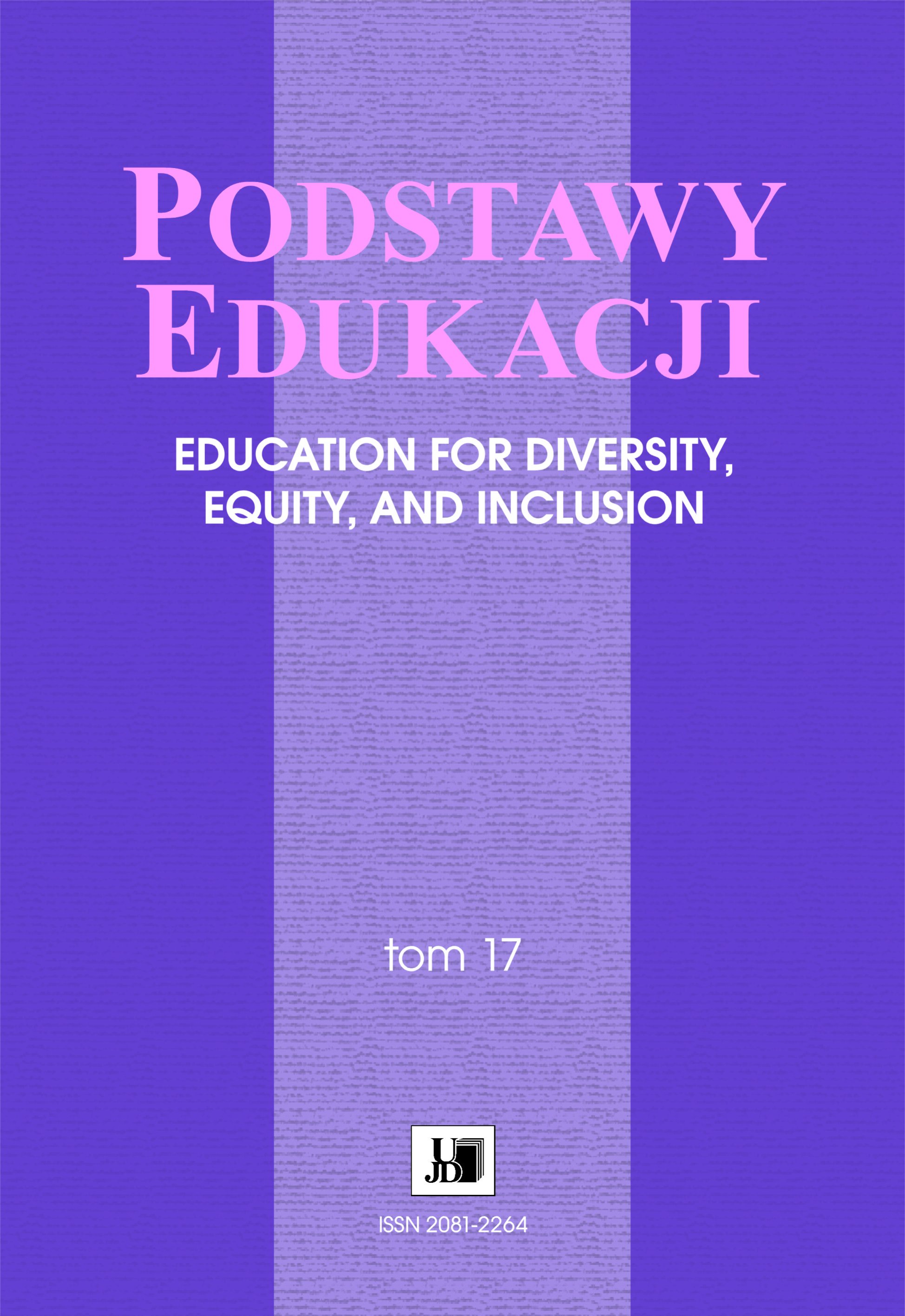Abstract
School environment is most often analysed from an adult viewpoint. This study shows various aspects of school life from students’ perspective in actual and preferred terms (teachers’ perception has been excluded) who experience and face various situations occurring at school environment. The research was executed among 1195 students, attending elementary school from 4th to 8th grade. The research tool was TROFLEI questionnaire (Technology-Rich Outcomes-Focused Learning Environment Inventory). The study has enabled identification of those aspects of everyday school reality, which are of utmost importance to the students. The study results suggest a change of teaching methods and styles in Polish school, as well as dropping the schematic approach, paying attention to student’s personal development and interpersonal relationships among students and between students and teachers. All that constitutes a necessary condition to create friendly atmosphere at school and determines successful realization of its function.
References
Afari, E., Aldridge, J.M., Fraser, B.J., Khine, M.S. (2013). Students’ perceptions of the learning environmentand attitudes in game-based mathematics classrooms. Learning Environments Res, 16, 131–150. https://dx.doi.org/10.1007/s10984-012-9122-6.
Aldridge, J.M., Fraser, B.J. (2008). Outcomes-focused learning environments: Determinants and effects. Leiden – Boston: Brill.
Aldridge, J.M., Dorman, J.P., Fraser, B.J. (2004). The use of multitrait-multimethod modelling to validate actual and preferred forms of the Technology-Rich Outcomes-Focused Learning Environment Inventory (TROFLEI). Australian Journal of Educational and Developmental Psychology, 4, 110–125.
Aldridge, J.M., Bianchet, S. (2022). Using student feedback about the learning environment as a starting point for co-construction. Learning Environment Research, 25, 939–955. https://dx.doi.org/10.1007/s10984-021-09403-9.
Brozmanová, M., Kosová, B. (2022). Consequences of National Testing of Primary School Pupils Through the Eyes of Teachers. The New Educational Review, 70, 71–81. https://cejsh.icm.edu.pl/cejsh/element/bwmeta1.element.ojs-doi-10_15804_tner_2022_70_4_06.
Closs, L., Mahat, M., Imms, W. (2022). Learning Environments influence students’ learning experience in the Australian Faculty of Business and Economics. LearningEnvironment Research, 25, 271–285. https://dx.doi.org/10.1007/s10984-021-09361-2.
Day, Ch. (1999). Developing Teachers: The Challenges of Lifelong Learning. London: Routledge.
Dorina R. (2013). School Climate as an Important Component in School Effectiveness. Academicus International Scientific Journal 8(8), 110–125. https://dx.doi.org/10.7336/academicus.2013.08.06.
Dorman, J.P., Fraser, B.J. (2009). Psychosocial environment and affective outcomes in technology-rich classrooms: testing a causal model, Social Psychology of Education, 12(1), 77–99. https://dx.doi.org/10.1007/s11218-008-9069-8.
Jagieła, J. (2023). Psychopedagogika relacji. Analiza transakcyjna dla nauczycieli i wychowawców. Warszawa: Difin.
Jagieła, J. (2009). Kryzys w szkole. Krótki poradnik psychologiczny. Kraków: Rubikon.
Khalil, N., Aldridge, J. (2019). Assessing students’ perceptions of their learning environment in science classes in the United Arab Emirates. Learning Environment Research, 22, 365–386. https://dx.doi.org/10.1007/s10984-019-09279-w.
Kulesza, M. (2011). Klimat szkoły a zachowania agresywne i przemocowe uczniów. Łódź: Wydawnictwo Uniwersytetu Łódzkiego.
Lombardi, E., Traficante, D., Bettoni, R., Offredi, I., Giorgetti, M., Vernice, M. (2019) The Impact of School Climate on Well-Being Experience and School Engagement: A Study With High-School Students. Frontiers in Psychology, 10. https://dx.doi.org/10.3389/fpsyg.2019.02482.
Maxwell, S., Reynolds, K.J., Lee E., Subasic E., Bromhead, D. (2017) The Impact of School Climate and School Identification on Academic Achievement: Multilevel Modeling with Student and Teacher Data. Frontiers in Psychology, 8. https://dx.doi.org/10.3389/fpsyg.2017.02069.
Molinari, L., Grazia, V. (2023). Students’ school climate perceptions: do engagement and burnout matter? Learning Environment Research, 26, 1–18. https://dx.doi.org/10.1007/s10984-021-09384-9.
OECD (2013), PISA 2012 Results: What Makes Schools Successful? Resources, Policies and Practices (Volume IV). OECD Publishing. http://dx.doi.org/10.1787/9789264201156-en.
OECD (2019). PISA 2018. Results (Volume III): What School Life Means for Students’ Lives. OECD Publishing, Paris. https://doi.org/10.1787/acd78851-en.
OECD (2023), "Schools as hubs for social and emotional learning: Are schools and teachers ready?", OECD Education Spotlights, No. 4, OECD Publishing, Paris. https://doi.org/10.1787/f6d12db7-en.
Ostaszewski, K. (2012). Pojęcie klimatu szkoły w badaniach zachowań ryzykownych młodzieży. Edukacja, 4(120), 23–38. https://www.cen.lomza.pl/files/badania_raporty/36300417/lib/Pojecie-klimatu-szkoly.pdf. [access: 12.03.23].
Piasecka, M. (2015). Środowiskowe ograniczanie czynników ryzyka uzależnienia młodzieży szkolnej od substancji psychoaktywnych. Kraków: Wydawnictwo Ignatianum.
Przewłocka, J. (2015). Klimat szkoły i jego znaczenie dla funkcjonowania uczniów w szkole. Raport o stanie badań. Warszawa: IBE.
Rusticus, S.A., Wilson, D., Jarus, T., O’Flynn-Magee, K., Simon, A. (2022) Exploring student perceptions of the learning environment in four health professions education programs. Learning Environment Research, 25, 59–73. http://dx.doi.org/10.1007/s10984-021-09349-y.
Sattler, D.N., Gruman, D.H., Enkhtur, O., Muskavage, B., Bishkhorloo, B. (2022). School climate in Mongolia: Translation and validation of the What is Happening in This School. Learning Environment Research, 25, 325–340. http://dx.doi.org/10.1007/s10984-021-09375-w.
Szymański, M.J. (2014). Problematyka codzienności w badaniach społecznych i pedagogicznych. In: E. Bochno, I. Nowosad, M. Szymański (eds.), Codzienność szkoły. Uczeń (pp. 9-25). Kraków: Wydawnictwo Impuls.
Thapa, A., Cohen, J., Guffey, S., Higgins-D’Alessandro, A. (2013). A Review of School Climate Research. Review of Educational Research, 83(3), 357–385. http://dx.doi.org/10.3102/0034654313483907.
Tubbs, J.E., Garner, M. (2008). The Impact Of School Climate On School Outcomes. Journal of College Teaching & Learning (TLC), 5(9). http://dx.doi.org/10.19030/tlc.v5i9.1230.
UNICEF Poland (2019). Children’s rights from the perspective of children, parents and teachers. Research report. UNICEF Poland.
Welch, A.G., Cakir, M., Peterson, C.M., Ray C.M. (2014). The relationship between gender and classroom environment in Turkish science classrooms, Educational Research and Reviews, 9(20), 893–903. https://doi.org/10.5897/ERR2014.1839.
Welsh, W.N. (2000). The Effects of School Climate on School Disorder. The ANNALS of the American Academy of Political and Social Science, 567(1), 88–107. http://dx.doi.org/10.1177/000271620056700107.
Zullig, K.J., Huebner, E.S. & Patton, J.M. (2011). Relationships among school climate domains and school satisfaction. Psychology In the Schools, 48(2), 132–145. https://dx.doi.org/10.1002/pits.20532.
Wysocka, E., Tomiczek, K. (2014). Szkoła jako środowisko życia i codzienność ucznia – analiza teoretyczna i empiryczne egzemplifikacje percepcji i sposobu wartościowania szkoły przez uczniów. Przegląd Pedagogiczny, 1, 169–188, https://cejsh.icm.edu.pl/cejsh/element/bwmeta1.element.desklight-ac09f417-99a8-47c9-803d-96134f40a60a [access: 22.02.24].

This work is licensed under a Creative Commons Attribution 4.0 International License.
Copyright (c) 2024 Beata Jakimiuk
